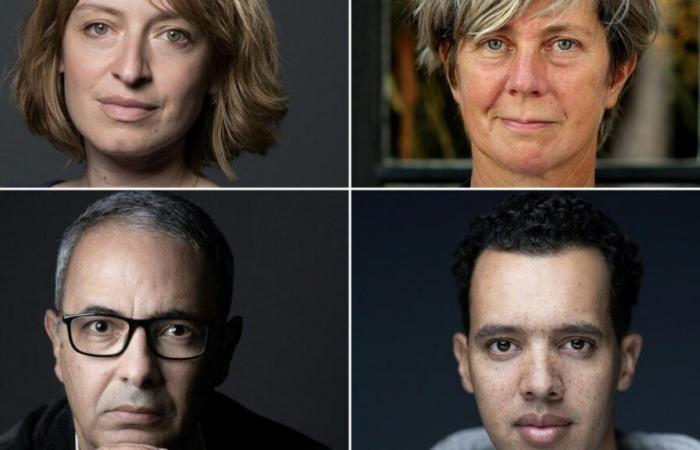Lhe ten Goncourt jurors must vote on Monday to choose the winner of the most prestigious French literary prize, with Kamel Daoud and Gaël Faye as favorites to succeed Jean-Baptiste Andrea.
There remain four contenders, these two writers, one who was a journalist and the other who is a singer, and two novelists who appear as outsiders, Sandrine Collette and Hélène Gaudy.
As has been the tradition for over a century, the decision was made at lunchtime at the Drouant restaurant, in the Opera district of Paris.
Kamel Daoud, a 54-year-old Franco-Algerian, with “Houris” (ed. Gallimard), a fiction about the massacres of the Algerian “black decade” (1992-2002), was nominated by five of the six literary journalists interviewed by Livres Hebdo as the most likely winner.
“Kamel Daoud will have it, not for literary reasons, but for political reasons,” according to an editor who spoke on condition of anonymity to AFP. Algeria’s decision to ban Gallimard Editions from the Algiers International Book Fair, from November 6 to 16, seems to work in its favor, in a very tense diplomatic context between France and Algeria.
But he has a serious competitor in the person of Gaël Faye, 42, with “Jacaranda” (ed. Grasset), another fiction, this one about the reconstruction of Rwanda after the 1994 genocide.
Also read
Goncourt, Renaudot and the others: Kamel Daoud, Gaël Faye or the others
“Clear and serious”
The two authors have in common not only that they have had success in bookstores during this literary season, but that they have already been finalists at the Goncourt, respectively in 2014 and 2016. Kamel Daoud, with “Meursault, contre-investigation”, then won the Goncourt prize for the first novel, while Gaël Faye, with “Petit pays”, the Goncourt for high school students.
Sandrine Collette, 54 years old, with “Madelaine avant l’aube” (editions JC Lattès) and Hélène Gaudy, 45 years old, with “Archipels” (editions de L’Olivier), are arriving at this stage for the first time.
Their novels have attracted attention with the quality of their style, but are published by publishers who are less influential with the jury, and moreover do not have as strong a political impact.
The media have expressed their preference. The daily Le Parisien said at the beginning of September that it had a weakness for Sandrine Collette’s book, “magnificent and poetic, very harsh but sometimes luminous”. The Télérama magazine on Sunday leaned towards “the beautiful, limpid and serious novel by Gaël Faye”.
The Goncourt 2024 is the first awarded under the presidency of Philippe Claudel. Elected to this position in May, this writer said he wanted “to be a democratic president, of whom the jurors can be proud”.
Many translations
He made it clear that he would do everything possible to ensure that the Goncourt Academy does not repeat the scenario of 2022 and 2023, namely 14 rounds of voting, the maximum planned, due to a persistent tie with five votes against five .
Beyond the pride of adding one’s name to the list, the Goncourt Prize is an economic issue. He is rewarded with a check for ten euros, which the winners traditionally choose to frame.
But above all, it makes it possible to sell hundreds of thousands of copies of a book that many readers will be curious to discover or offer, and it opens the way to numerous translations throughout the world.






